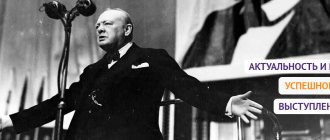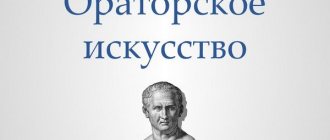Despite all his evil genius, Hitler’s oratorical talent is obvious: not only the masses who were far from politics and history, but also people well educated in these areas, succumbed to his influence. This can be explained by the Fuhrer’s ability to capture the type of thinking of his listeners: Hitler’s speech was always tailored to their perceptions and ideas. Analysts identify several features inherent in the politician’s speeches, which were decisive in his ability to capture the attention of the audience.
Directing Nazi rallies
Up to half a million participants and spectators gathered at the NSDAP (National Socialist Workers' Party of Germany) congresses in Nuremberg.
(08/26/2009) In this historical case, the situation was completely different. There was a strong imbalance of power here, since Hitler was much more active than representatives of other parties. In addition, the parliamentary path to power was only a tactical move for the National Socialists, since an attempt to come to power by revolutionary means (“Beer Hall Putsch”) ended in imprisonment for Hitler in 1923. Considering this fact, the results of our study are indeed somewhat unexpected.
— Is it possible to say that earlier researchers attached greater importance to Hitler’s public speeches?
— There are not many empirical studies on this topic. There is a widespread opinion among historians that National Socialist propaganda played a certain role in strengthening the position of the NSDAP. At first glance, one can find signs indicating the effectiveness of Hitler's election campaigns and rhetoric. There are many accounts of eyewitnesses who personally listened to Hitler's speeches and were captivated and convinced by these speeches. On the other hand, the strengthening of the position of the NSDAP occurred at a time when Hitler was most active as a speaker. The NSDAP largely stagnated—both in terms of its electoral performance and in an organizational sense—while Hitler was imprisoned in 1923–1924 and while the Weimar Republic had laws prohibiting Hitler from speaking in public. Actually, the very fact that the authorities imposed this ban indicates that they believed that Hitler was a very strong and therefore dangerous speaker.
— The data you presented refutes this point of view. But what then helped Hitler’s party come to power?
— We have not considered this issue. In our research, we focused on studying the effect of the NSDAP election campaigns, in particular, Hitler's speeches. But there are many studies about the reasons for the collapse of the Weimar Republic. The factors that are named in these studies: the economic crisis, insufficient support for democracies from the elites and the masses, weak institutions of power... All these are very obvious factors.
— In your research, you looked at the period before the Nazis came to power. How did Hitler's public appearances during this period differ from his time in power?
- There are studies that show the strong and lasting effect of Nazi propaganda after Hitler came to power in January 1933 until the end of the National Socialist era in 1945. It is clear, however, that in order to achieve such a result, more or less complete control over society was needed.
See also:
Stalin and Hitler: how their friendship began and ended
Martin Luther King Jr.
Martin Luther King Jr. is considered a symbol of oratory. His “I have a dream...” speech is well known throughout the world. King was a Baptist preacher with an excellent use of classical prose rhythm. He was a real master, having a whole range of oratorical techniques. King learned a lot as a Baptist preacher.
His powerful speeches focused on important moral issues. The speaker always appealed to the hearts of people and to their imagination, and not just to the mind. The tone and rhythm of his speeches created the impression that he was not just speaking, but reciting poetry. King modulated his voice by speaking through his diaphragm rather than his larynx. The pace of his speeches was very slow and confident. Martin Luther King often used long pauses to make his speech memorable. He was inspired by Shakespeare, the Bible and other civil rights thinkers. King spent a lot of time writing, editing and rewriting his speeches. This made them more powerful and motivating.
Signing
Joachim von Ribbentrop (left), Joseph Stalin (second from left) and Vyacheslav Molotov (signing, sitting on the right). On the part of the USSR, the treaty was signed by the People's Commissar for Foreign Affairs Molotov, on the part of Germany - by its Minister of Foreign Affairs Ribbentrop. The treaty is often called the "Molotov-Ribbentrop Pact".
Stalin and Hitler: how their friendship began and ended
Molotov and Hitler
The parties to the agreement were obliged to refrain from attacking each other and to maintain neutrality in the event that one of them became the target of military actions by a third party. The agreement was accompanied by a secret additional protocol on the delimitation of areas of mutual interests in Eastern Europe. Molotov was on a return visit to Berlin. In the picture he is on the left with Hitler and a translator.
Stalin and Hitler: how their friendship began and ended
Demosthenes
In Ancient Greece there lived a great master of oratory - Demosthenes. His life story is an inspiration to those who want to be a speaker. As a child, he was not surrounded by care like other children. Only women were involved in raising Demosthenes, since his father was in distant lands.
He did not receive the care and love of his parents, often finding solace in reading books. Being a weak child, Demosthenes also stuttered. But the older the boy got, the more he wanted to become a speaker. He began to try to get rid of his shortcomings: he went to the seashore and talked loudly to the waves, after filling his mouth with stones.
To get stronger physically, the teenager regularly ran across the hills and plains, while singing songs or speaking loudly. He learned to face people boldly and speak confidently. For the first time, the young man publicly demonstrated his talents while representing his father's case in court. He had to talk to a group of scientists. Demosthenes had great success there. From a sickly child who stuttered, he grew into the greatest orator of Ancient Greece.
Hitler on the pact and Stalin's position
“Our enemies counted on the fact that Russia would become our enemy after the conquest of Poland... I was convinced that Stalin would never accept the British proposal. Only reckless optimists could think that Stalin was so stupid that he did not recognize their true goal. Russia is not interested in preserving Poland... Now... the way is open for soldiers,” Adolf Hitler (1939).
Stalin and Hitler: how their friendship began and ended
Details of the image of a politician as a speaker
Features of the appearance of a person belonging to a certain occupation are important in creating his style and image. In order not to reduce his authority before the public, Hitler hid his origins, relatives and family, and any attempts to find out were harshly suppressed. The politician believed that this could negatively affect his reputation and ability to persuade.
Otherwise, the speaker did not use external, eye-catching attributes during his speeches - people were easily influenced by him, so the use of additional appearance details was not necessary.
"Treacherous monster" named Hitler
“...how could it happen that the Soviet government agreed to conclude a non-aggression pact with such treacherous people and monsters as Hitler and Ribbentrop? Was there a mistake made here by the Soviet government? Of course not! A non-aggression pact is a peace pact between two states,” from Stalin’s speech (1941, after Hitler’s attack on the USSR).
Stalin and Hitler: how their friendship began and ended
Legend 5. Actually was a Jew
Verdict: This is not true.
Ethnic German immigrants at the railway station in Graz. 1940 Bundesarchiv
This legend is also connected with the unclear origin of Alois Schicklgruber-Hitler. According to one version, Maria Anna served in the house of the Jewish Frankenbergers (or Frankenreiters) in Graz: it was at this time that she became pregnant with Alois. This version surfaced at the Nuremberg trials: Hans Frank, a close associate of the Fuhrer, said that in 1930 Hitler ordered him to investigate the origins of Alois - however, Frank had no evidence.
In his book, published in 1971, historian Werner Maser tried to trace the Fuhrer's ancestry through documents from the Waldviertel district, to which the village of Strones belonged. Mather managed to prove that in the 19th century there were no Jews or people with the surname Frankenberger among the inhabitants of Graz. Maria Anna herself came from an Austrian peasant family; the Giddler-Güttler brothers also had no Jewish roots.
Background
The agreement was signed after a period of very serious cooling in Soviet-German relations caused by Hitler’s rise to power, and armed conflicts in which the USSR opposed the Hitlerite coalition: Germany and Italy in Spain, Japan in the Far East. The agreement came as a surprise not only to third countries, but also to the population of the USSR and Germany.
Stalin and Hitler: how their friendship began and ended
Winston Churchill
The great orators of the 20th century cannot be mentioned without the name of Winston Churchill, whose merits were sufficient both in the political sphere and in the literary sphere (for the latter he was awarded the Nobel Prize). The path of the British Prime Minister in oratory is somewhat similar to the road to the skill and glory of the aforementioned Demosthenes: after all, just like his ancient Greek colleague, Churchill had speech impediments, but, having pulled himself together and calling on remarkable willpower to help, managed to overcome this obstacle, which earned him a place on this list.
results
On September 1, 1939, Germany launched an invasion of Poland, and on September 17, 1939, Soviet troops entered Polish territory. The territorial division of the country was completed on September 28, 1939 with the signing of a friendship and border treaty between the Soviet Union and Germany. Later, the Baltic countries, Bessarabia and Northern Bukovina, as well as part of Finland, were annexed to the USSR.
Stalin and Hitler: how their friendship began and ended
Beginning of World War II
The Polish campaign of the Wehrmacht was a military operation, as a result of which the territory of Poland was completely occupied, and parts of it were annexed by the “Third Reich” and the USSR. In response to Hitler's aggression, Great Britain and France declared war on Germany, marking the beginning of World War II. Its date began to be considered September 1, 1939 - the day of the invasion of Poland.
Stalin and Hitler: how their friendship began and ended
Partition of Poland
German troops defeated the Polish armed forces. On September 17, Soviet troops entered the territory of Poland - as officially reported, with the aim of annexing Western Belarus and Western Ukraine to the USSR. The territory of Poland was divided between Germany and the Soviet Union in accordance with the secret protocols to the non-aggression and friendship and border treaties, as well as Lithuania and Slovakia.
Stalin and Hitler: how their friendship began and ended
Steve Jobs
A modern speaker whose skills will be assessed by future generations through YouTube videos, he reflects the spirit of the twenty-first, digital, century. Seeing the pace at which this man has promoted the company with his Apple products, it is difficult to doubt his mastery of oratory. Unlike the above examples, Steve Jobs, however, directed his eloquence not into the political sphere of activity, but into marketing. This brought its well-deserved results. Mr. Steven Jobs' magnetic, charismatic and memorable way of speaking deserves to be mentioned on this list.
Joint parade in Brest
On September 14, 1939, the German 19th Motorized Corps attacked and occupied Brest-on-Bug (then a Polish city). On September 22, Brest was handed over to the 29th Tank Brigade of the Red Army during an impromptu parade. The parade is being accepted: in the center - General Guderian (commander of the 19th motorized corps), on the right - commander of the 29th light tank brigade of the Red Army, brigade commander Semyon Krivoshein.
Stalin and Hitler: how their friendship began and ended
Symbol city
The city of Brest became part of the USSR as the center of the newly formed Brest region of the Belarusian SSR. The Soviet-German demarcation line ran along the Western Bug River. And it was this city that on June 22, 1941, was one of the first to be attacked by German troops. The defense of the Brest Fortress became a symbol of perseverance, courage and military valor. The photo shows a parade during the transfer of the city to the Red Army in 1939.









